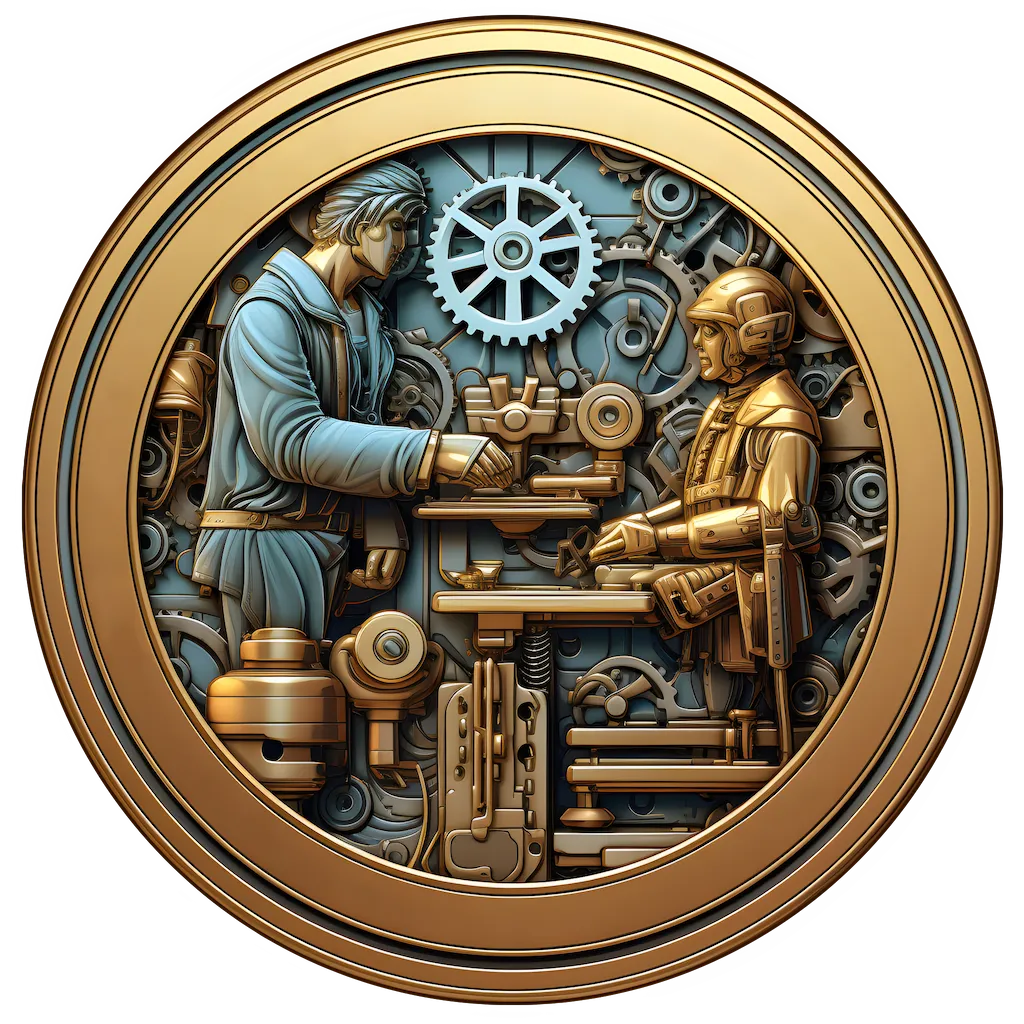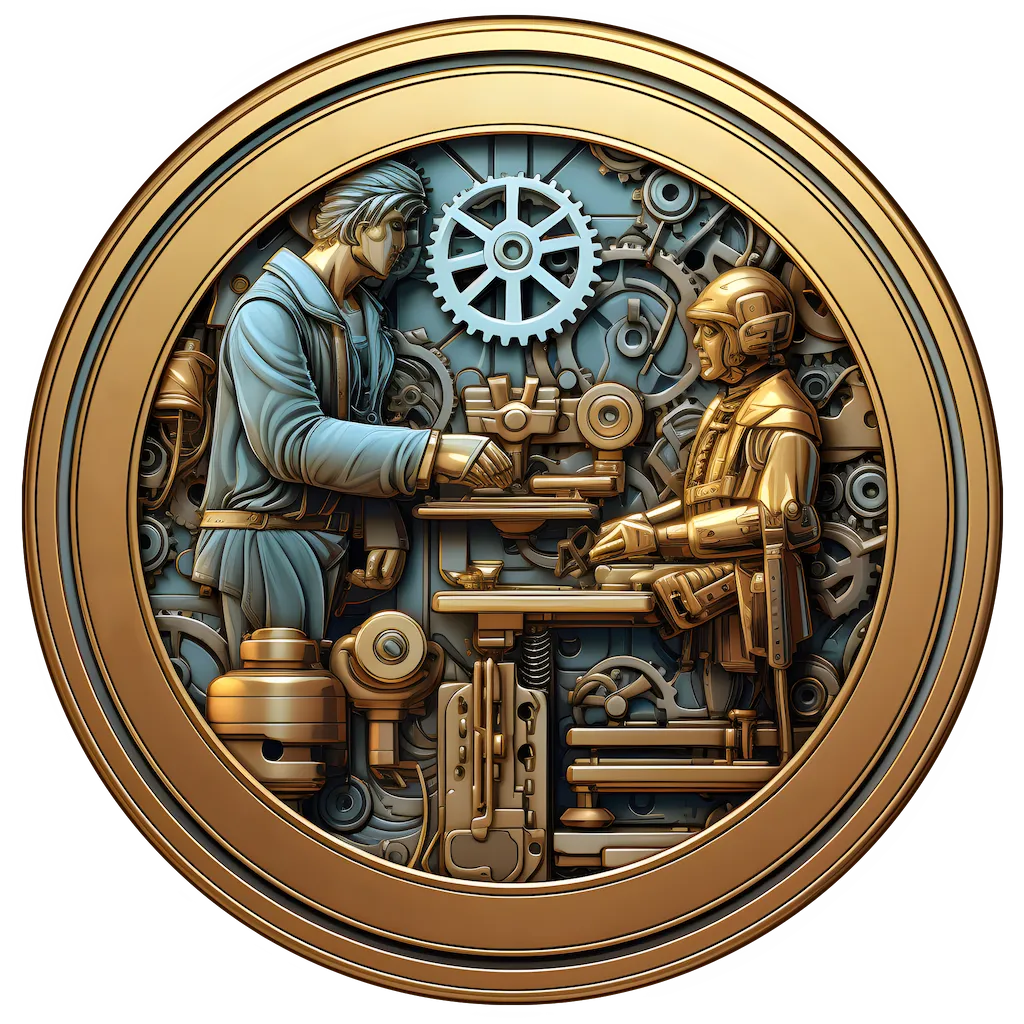tokreate

A minimal library to create tokens using LLMs.
Tokreate

A minimal library to create tokens using LLMs.
I refuse to write more than 200 lines of code for this. No LangChain shenanigans. See tokreate.py to see how well I’m sticking to this.
Tokreate is available on PyPI! Simply run:
pip install tokreate
to get started.
Use the following shortcut to navigate to a section and learn more about tokreate:
Usage
Below, I show some ways tokreate can be used to prompt LLMs.
A Simple Call Action
from tokreate import CallAction
greetings = CallAction(
prompt="Hello, my name is {{ name }}; what's yours?",
model="gpt-3.5-turbo"
)
# tokreate always returns a history of the conversation
history = greetings.run(name="Alice")
for turn in history:
print(repr(turn))
# user>>> Hello, my name is Alice; what's yours?
# assistant>>> Hello Alice, nice to meet you! I'm ChatGPT. How can I assist you today?
Chaining Actions
from tokreate import CallAction
greetings = CallAction(
prompt="Hello, my name is {{ name }}; what's yours?",
model="gpt-3.5-turbo"
)
tell_joke = CallAction(
prompt="Can you finish this joke: What do you call a {{ animal }} with no legs?",
model="gpt-3.5-turbo"
)
history = (greetings >> tell_joke).run(name="Alice", animal="snake")
for turn in history:
print(repr(turn))
# user>>> Hello, my name is Alice; what's yours?
# assistant>>> Hello Alice, nice to meet you! I'm ChatGPT. How can I assist you today?
# user>>> Can you finish this joke: What do you call a snake with no legs?
# assistant>>> What do you call a snake with no legs? A "legless" reptile!
You can use parsers to extract information from any call:
import json
from tokreate import CallAction, ParseAction
random_numbers = CallAction(
prompt="Return a list of {{ random_count }} random numbers.",
system="You are an helpful assistant who responds by always returning a valid JSON object.",
model="gpt-3.5-turbo"
)
json_parser = ParseAction(
parser=json.loads
)
*_, last_turn = (random_numbers >> json_parser).run(random_count='five')
parsed_content = last_turn.state["json.loads"]
print(f"Response {parsed_content} (type: {type(parsed_content)})")
# Response {'numbers': [4, 9, 2, 7, 1]} (type: <class 'dict'>)
Using Different Models
This is an example on how to use Anthropic’s models:
from tokreate import CallAction
greetings = CallAction(
prompt="Hello, my name is {{ name }}; what's yours?",
model="claude-instant-v1.1"
)
history = greetings.run(name="Alice")
for turn in history:
print(repr(turn))
# user>>> Hello, my name is Alice; what's yours?
# assistant>>> I'm Claude, an AI assistant created by Anthropic.
Let’s try with one of the TogetherAI models:
from tokreate import CallAction
greetings = CallAction(
prompt="Hello, my name is {{ name }}; what's yours?",
model="togethercomputer/llama-2-70b-chat",
history=False # TogetherAI models don't support history at API level yet :( you can make your own in prompt
)
history = greetings.run(name="Alice")
for turn in history:
print(repr(turn))
# user>>> Hello, my name is Alice; what's yours?
# assistant>>> Hello Alice! My name is ChatBot, it's nice to meet you. How can I assist you today? Is there a specific topic you'd like to discuss or ask me a question about?
Async Support
You can make calls to LLMs asynchronously thanks to async support in tokreate. Note that some APIs (e.g., Anthropic) might support very few concurrent calls by default.
import asyncio
from tokreate import CallAction
async def main():
greetings = CallAction(
prompt="Generate a very short description of the color {{ color }}.",
model="gpt-3.5-turbo"
)
futures = []
for color in ["red", "green", "blue"]:
futures.append(greetings.arun(color=color))
results = await asyncio.gather(*futures)
for (request, response) in results:
print(f"{request.state['color']}:", response)
if __name__ == "__main__":
asyncio.run(main())
# red: Passionate and intense, red is a vibrant hue that evokes feelings of love, power, and energy.
# green: Green is the vibrant hue of nature, symbolizing growth, freshness, and harmony.
# blue: Blue is a cool and calming color that evokes feelings of tranquility and serenity.
Design
I tried to keep the design of tokreate as simple as I possibly could. The library is composed of two main classes: a Turn and Action.
- Turns are serializable objects that represent a single turn in a conversation.
- Actions are objects that use prompts to call an LLMs. Actions generate turns.
Turn APIs
Under the hood, turns are Dataclasses objects. Each turn has the following fields:
Turn.role: this can be eitheruserorassistant, depending on who generated the turn.Turn.content: the output of the LLM if the turn was generated by an action. Otherwise, this is the prompt from an action.Turn.state: a dictionary that can be used to store any information. Typically this is either variables provided when calling therunmethod of an action, or the output of aParseAction.Turn.meta: a dictionary that stores metadata, typically from calling an LLM api.
For example, the following code produces a turn with the following content:
from tokreate import CallAction
greetings = CallAction(
prompt="Hello, my name is ; what's yours?",
model="gpt-3.5-turbo"
)
user_turn, assistant_turn = greetings.run(name="Alice")
print("User turn:")
print('\trole:', user_turn.role)
print('\tcontent:', user_turn.content)
print('\tstate:', user_turn.state)
print('\tmeta:', user_turn.meta)
print('\n')
print("Assistant turn:")
print('\trole:', assistant_turn.role)
print('\tcontent:', assistant_turn.content)
print('\tstate:', assistant_turn.state)
print('\tmeta:', assistant_turn.meta)
# User turn:
# role: user
# content: Hello, my name is Alice; what's yours?
# state: {'name': 'Alice'}
# meta: {}
# Assistant turn:
# role: assistant
# content: Hello Alice, nice to meet you! I'm ChatGPT. How can I assist you today?
# state: {'name': 'Alice'}
# meta: {'tokens_prompt': 18, 'tokens_completion': 21, 'latency': 0.47, 'messages': [{'role': 'user', 'content': "Hello, my name is Alice; what's yours?"}], 'temperature': 0, 'max_tokens': 300}
Note that str(turn) returns the content of the turn, and repr(turn) returns ‘{role}»> {content}’.
Action APIs
Actions are objects that use prompts to call an LLMs. Actions are run through the run() method, and always return a list of turns (i.e., a history). They can be chained together using >> and << operators. A chain is itself an action.
The library supports two types of actions: CallAction and ParseAction. In theory, one could add actions for retrieval, planning, etc. In practice, I don’t think those are in scope for this library, and can be added by users.
CallAction
A CallAction is an action that calls an LLMs. It requires two parameters:
prompt: the prompt to use when calling the LLMs. Prompts are parsed using jinja2; each prompt has access to all variables passed by the user when calling therun()method of the action; thestateof the previous turn, and thehistoryof the conversation so far.model: the name of the model to use. This is a string that can be found by runningpython -m tokreate.registry.
For example, the following chain of action uses many advanced features of jinja2 templating language:
from tokreate import CallAction
system = "You are a conversational assistant. You like to talk, but prefer giving short answers."
greetings_action = CallAction(
prompt="Hello, my name is {{ name }}; what's yours?",
model="gpt-3.5-turbo"
)
hobbies_action = CallAction(
prompt="What are your hobbies? Mine are {% for hobby in hobbies %}{{ hobby }}{% if not loop.last %}, {% else %}.{% endif %}{% endfor %}",
model="gpt-3.5-turbo"
)
color_action = CallAction(
prompt="What's your favorite color? Mine is {{ favorite_color }}",
model="gpt-3.5-turbo"
)
reflect_prompt = """
So far, you told me that:
{% for turn in history %}{% if turn.role == "assistant" %}
- "{{ turn.content.strip() }}"{% endif %}{% endfor %}
Please reflect on what you told me, and what it says about you.
""".strip()
reflect_action = CallAction(
prompt=reflect_prompt,
model="gpt-3.5-turbo"
)
history = (
greetings_action
>> hobbies_action
>> color_action
>> reflect_action
).run(
name="Alice",
hobbies=["reading", "writing", "running"],
favorite_color="blue"
)
for turn in history:
print(repr(turn))
ParseAction
The parse action is used to convert the content of the last turn into a conversation using a function. The output of the conversion is saved in the state of the turn.
For example, a parse action can be used to convert the output of an LLMs into a JSON object:
import json
from tokreate import ParseAction
from tokreate.tokreate import Turn
turn = Turn(
role="assistant",
content='{"numbers": [4, 9, 2]}'
)
json_parser = ParseAction(
parser=json.loads,
name="structured_output"
)
*_, parsed_turn = json_parser.step(history=[turn])
assert parsed_turn.state["structured_output"] == {"numbers": [4, 9, 2]}
Note how name is used to specify the key in the state where the output of the parser should be saved. If name is not specified, the output of the parser is save at {function_module}.{function_name} (in this case, it would be at parsed_turn.state["json.loads"]).
Supported APIs
This library currently supports OpenAI, Anthropic, and TogetherAI. For a list of all models, run python -m tokreate.registry. Please open an issue on GitHub to request support for a new API.
GPT Json Output (New! 11/06)
Tokreate has been updated to keep advantage of the newest GPT-3 API features. For example, using -1106 models, we can ensure that the output of the API is a valid JSON object:
from tokreate import CallAction
random_action = CallAction(
model="gpt-3.5-turbo-1106",
prompt="Give me three random numbers as a JSON array",
parameters={'response_format': {'type': 'json_object'}}
)
*, response = random_action.run()
print(response)
# {
# "numbers": [5, 23, 17]
# }